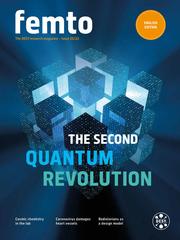URL: https://www.desy.de/news/news_search/index_eng.html
Breadcrumb Navigation
DESY News: Partnership on quantum computing: DESY joins the IBM Quantum Network
News
News from the DESY research centre
Partnership on quantum computing: DESY joins the IBM Quantum Network
DESY and IBM have entered an agreement on quantum computing that welcomes DESY as a member of the IBM Quantum Network to explore the opportunities of the new technology. DESY seeks to exploit opportunities for solving scientific problems much more efficiently in the future on quantum computers, and even potentially tackle challenges that are not accessible to classical computers. With this partnership IBM hopes that DESY will identify new and important fields of application for this nascent technology.

Cryostat of an IBM quantum computer. The cryostat, which is usually made of gold, houses the quantum bits, the central storage units of a quantum computer. Depending on the technology, they have to be cooled to cryogenic temperatures just above absolute zero. Credit: IBM
In addition to hoped-for applications in fundamental research, advancements are being sought, for example, for the development of new materials, the solution to complex logistics problems, novel approaches to battery research, efficient ways to model financial data and the analytical design of innovative drugs.
“As an IBM Quantum Network Hub, DESY and their collaborators will further expand our ecosystem in Germany, applying their fundamental knowledge base in the decoding of matter to solving important questions of society, science and industry,” said Heike Riel, IBM Fellow and Head of Quantum Research at IBM Research - Europe in Zurich.
As a hub, the CQTA at DESY will also provide researchers from industry and other academic institutions with access to IBM’s quantum systems, which will allow researchers to explore the solution to their problems on the latest generation of quantum computers.
The CQTA opens the opportunity for scientists and engineers to familiarize themselves with quantum computers and to develop novel, efficient quantum algorithms for targeted applications. With access to IBM quantum systems, the CQTA will also offer a comprehensive training and education program to make a new generation of scientists and engineers in Germany “quantum ready” on path to becoming world leaders in quantum computing.
“Now is exactly the right time to develop algorithms and methods for a broad portfolio of applications to make the most of quantum computing in the future,” says Jansen. “DESY’s access to IBM Quantum is a crucial step into the future to make quantum computing a tool we can use in our daily lives. It is also a strategic milestone for DESY, the quantum ecosystem in Germany, and for international collaborations.”
The first steps in the direction of developing novel quantum algorithms being pursued at CQTA are error mitigation methods. These mitigate the effect of the error sources (noise) on the computation that still exist now in today’s quantum computers. The aim is to optimize the construction of so-called quantum circuits, which form the basis of calculation on a quantum computer.
Such methodological developments could so far only be investigated with very few quantum bits. As a hub in the IBM Quantum Network, DESY will have access to universal quantum computing systems as well as to IBM Quantum expertise and software development tools, which will allow CQTA to investigate such developments on a much larger scale and thus much closer to real-world problems.
Further reading:
DESY activities on quantum computing and quantum technologies are described in the latest issue of the DESY research magazine femto: www.desy.de/femto_eng/




